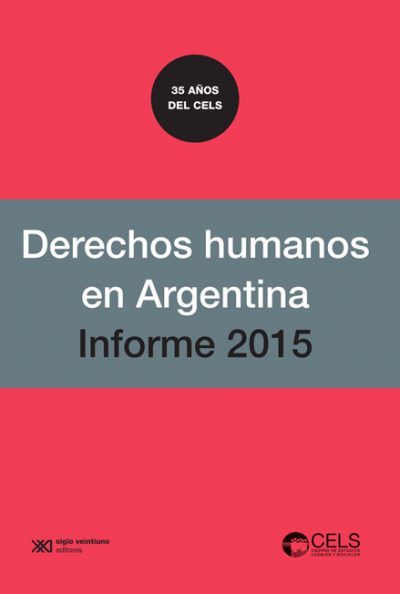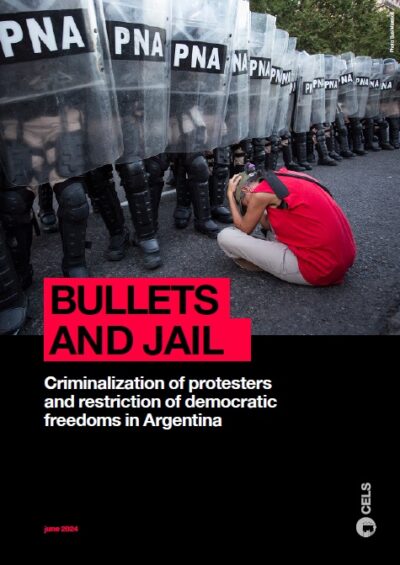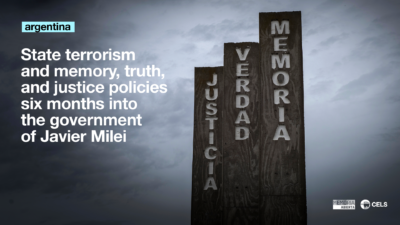For the land: A documentary series about agribusiness and human rights
Four episodes, four countries, four stories that show how the use of pesticides affects health, access to land and environment of different communities in Argentina, Bolivia, Paraguay and Brazil.
The Government reaffirmed its policy of criminalizing protests and defended its use of repression before the IACHR
During a public hearing requested by human rights, labor, and social organizations, representatives from the Inter-American Commission on Human Rights (IACHR) and the United Nations expressed their concerns about the use of force, arbitrary detentions, the Ministry of Security’s protocol, and the stigmatization of demonstrators and social organizations.
Bullets and jail: Criminalization of protesters and restriction of democratic freedoms in Argentina
Autor/a: CELS
14 pages
ver más
AMIA bombing: landmark ruling by the Inter-American Court of Human Rights condemns Argentine state
The international tribunal confirmed that the Argentine State is responsible for violating the human rights of the victims and their families, and the collective right to truth, and must commit to investigations and reparation measures. Joint statement from Memoria Activa and CELS.
State terrorism and memory, truth, and justice policies six months into the government of Javier Milei
Autor/a: CELS & Memoria Abierta
15 pages
ver más
Fiscal policies are essential to address the climate crisis
We participated in a consultative opinion hearing of the Inter-American Court of Human Rights on climate emergency to orally present an amicus curiae prepared alongside other organizations. Developing fiscal policy standards is essential to addressing the consequences of climate change.
Repression at the Congress: we call on the IACHR to protect the right to protest
Together with human rights defender organizations, we asked that the Inter-American Commission on Human Rights (IACHR) take precautionary measures in favor of press workers, human rights defenders, and protesters. We expressed our deep concern about the recurrence of disproportionate security operations that result in people being detained and seriously injured.
On Milei’s “omnibus bill”
The Argentine government led by Javier Milei seeks to dismantle essential procedures and implement regressive measures affecting human rights and democracy. Within a span of three weeks, from Decree 70/23 to the proposed “Bases…” law, the Executive Branch introduced 1649 articles altering the entire social and political landscape, protection parameters, and state architecture. Congress bears the political responsibility to refrain from validating it.
We submit that the Judiciary declare President Milei’s DNU 70/2023 unconstitutional
We filed a petition with Argentina’s federal administrative court. It is our view that the decree violates the separation of powers, suppressing or restricting individual and collective rights and guarantees. We underscore that the DNU’s submission by the executive power breaches constitutional rules, usurping powers that are prohibited to him and reserved for the National Congress.
We denounced before the IACHR the increase in indiscriminate use of less lethal weapons to suppress protests
With over 20 international and regional organizations we questioned the irregular and disproportionate use of these weapons by security forces and their serious consequences on health and human rights of people who exercise their right to protest.
Imparable 2023: a festival to debate, reflect and expand Argentina’s democracy
On Sunday, November 5th, thousands of people came together at the Malvinas Argentinas stadium in Buenos Aires to listen, debate and dance. Among families, friends, activists, different generations and organizations, we engaged in a grand collective conversation to imagine a common future.
The arms market and its impact on human rights
CELS and the INECIP submitted a joint report to the Inter-American Court of Human Rights to help develop legal standards to guide the design and implementation of State regulations to protect human rights in the production and marketing of firearms.
The price of debt: a podcast about the impact of debt on our rights
Narrated by journalist Noelia Barral Grigera and with the participation of analysts, social activists, and experts in economics and politics , among others, CELS is launching a podcast series on Argentina’s external debt. In six episodes, which will be available on Spotify, we delve into what debt is, its scope, and why it is important to understand the tangible consequences it has on fundamental rights such as work, health, and education.
2023 Emilio Mignone International Human Rights Award: nominations are open
Candidates will be admitted from July 10 to September 15, 2023. The award is inspired by the life and work of a founding member of CELS.
Más que nunca’s book release at teatro picadero
With Lef Nawel, Juan Ruocco, Dina Sánchez, Ángela Urondo Raboy, and Paula Litvachky on stage, before a full audience, we delved into the debates put forth in the new book published by CELS and Siglo XXI.
Magdalena massacre hearing at the IACHR: the State acknowledges responsibility for the 33 deaths
More than 17 years later, the Argentine State acknowledged before the Inter-American Commission on Human Rights its international responsibility for the incident and committed to put a series of measures in place to prevent such cruel deaths from ever happening again. CELS and the Colectivo de Investigación y Acción Jurídica (CIAJ) took part in the hearing as representatives of the victim’s families.
At the final hearing before the Inter-American Court for the AMIA bombing, the Argentine State acknowledged its responsibility
On October 13-14, the final hearing was held in Montevideo, Uruguay in the case filed by CELS and Memoria Activa in 1999 charging the Argentine State with international responsibility for the attack on the AMIA Jewish Community Center in Buenos Aires.
Right to protest: meeting of Latin American organizations
On July 25-27 we held an event in Buenos Aires to debate current reality in our region with colleagues from Brazil, Colombia, Chile, Honduras, Ecuador and Mexico.
Patents: Life Is Not a Commodity
The economic perspective that has been imposed on accessing life-saving technology faces us with a new global division between vaccinated and unvaccinated countries. A waiver on intellectual property could eliminate unequal access to vaccines and shortages.
Ending the Criminalization of Abortion Is Urgent
A new political opportunity is presenting itself in the long struggle for the right to voluntary abortion, for the sake of health, equality and dignity. We urge the National Congress to do its share in expanding the sexual rights of millions of persons and make history.
AMIA Bombing: Argentina Responsible For Impunity and HR Violations, IACHR
In its Merits Report, the Inter-American Human Rights Commission states that Argentina violated the right to life, to the personal integrity of the victims and their next of kin, the right to adequate judicial protection, and the right of society as a whole to the truth.
Guernica Land Occupation: The Solution Is Housing
The situation deserves a reaction to the true problem: thousands of people have nowhere to live.
Individual and Collective Mourning Require Assistance
Grief must be considered as a right, which cannot be reduced to an individual matter. Families and individuals should not face alone the demise of their loved ones. The impact of these deaths needs to be shared and processed collectively. Joint document with Memoria Abierta.
The Inter-American Court of Human Rights Found Argentina Guilty And Ruled In Favor Of The Indigenous Communities of Salta
Argentina is ordered to cede an undivided deed to 4000 km2 of ancestral territory to the Lhaka Honhat Association of Aboriginal Communities, among other reparations.
Bolivia: Coup and the return of the military “issue”
We condemn the coup d’état, political persecution and the violence committed by those who do not respect the democratic order in Bolivia. This rupture with the rule of law should prompt an immediate reaction by the region’s states. It is imperative that regional mechanisms and UN bodies initiate a dialogue with countries, in particular to ensure the right to asylum and refuge.
AMIA attack: We ask that Argentina be held responsible and the case be sent to the Inter-American Court
On November 11, a pleading hearing in the AMIA case took place at the 174th session of the Inter-American Commission on Human Rights (IACHR), held in Quito, Ecuador. The participants in the hearing included Diana Wassner de Malamud and Adriana Reisfeld, from the Memoria Activa association of family members of AMIA victims, as well as … Continued
We seek to act as plaintiffs in the Acindar case
A plant owned by the Argentine steelmaker housed both a clandestine detention center and a police outpost during the 1976-1983 dictatorship. Company executives pointed out the workers who should be kidnapped and provided the military with photographs from their personal files so they could be identified.
Security Ministry promotes the abusive use of lethal force and weakens oversight of police
The government modified regulations on the use of firearms by security force members. The move weakens judicial oversight, and the broad nature of what is defined as an “imminent danger” justifies and enables the abusive use of lethal force.
#WeMadeOurChoice
The green scarf of the National Campaign for the Right to Legal, Safe and Free Abortion became part of the uniform of high school students. Teenage girls formed gender committees within student councils and are coordinating efforts to fight for their rights.
Emergency decree against migrant persons: a selective and discriminatory policy
Today marks one year since the national government modified via emergency decree the country’s Migration Law, a product of years of collective struggle for democratic migration legislation. The result is a policy of selectivity that puts people under permanent suspicion.
WTO meeting in Argentina: Rejected accreditations and deportations
The government rejected the accreditations of 65 people who planned to participate in the WTO Ministerial Conference in Buenos Aires and sent the list to immigration officials as a security “alert.” Two people on the list were ultimately deported.
OAS must reject the Argentine candidate for the IACHR
The countries of the OAS must elect new commissioners to the IACHR. In February we formally objected to the Argentine state’s candidate. In addition, two ex-presidents of the IACHR, an international panel of independent experts and more than 60 scholars rejected his candidacy.
“Never Again Silence”: Vera Jarach with Angela Merkel at Parque de la Memoria memorial site
The European Center for Constitutional and Human Rights and the German Coalition against Impunity, together with Argentine human rights organizations, presented a letter to German Chancellor Angela Merkel during her visit to the Parque de la Memoria.
Surveillance and the use of “less lethal” weapons during protests
Michael Power of South Africa’s Legal Resources Centre, Homer Venters from Physicians for Human Rights, and Matthew Cagle from the American Civil Liberties Union share reflections on state responses to social protest.
Corporate responsibility in crimes against humanity: Personal reflections
Victorio Paulón, a metalworker and union leader who was detained during Argentina’s 1976-1983 dictatorship, discusses judicial reluctance to prosecute corporate responsibility for the crimes against humanity committed under state terrorism.
Brutal police operation and torture of Nam Qom community in Formosa: hearing before IACHR
A hearing will be held before the Inter-American Commission on Human Rights (IACHR) regarding violence against the Nam Qom community in August 2002 and the lack of state response.
Snowden: “In all countries where we see a strong and secret intelligence agency, we see abuses”
Edward Snowden spoke about the lack of oversight of intelligence systems and the scope of this problem.
The lessons of Ayotzinapa: International investigators talk about the case
Carlos Beristain and Claudia Paz y Paz, members of the Interdisciplinary Group of Independent Experts (GIEI) that investigated the disappearance of the 43 students from Ayotzinapa, visited Argentina.
Kidnapped and coerced: Liliana’s story
In this photo essay, produced in collaboration with WOLA, Liliana recounts how she was threatened and forced into transporting drugs to Argentina, where she is now being incarcerated far from her two children in Venezuela.
Legal arguments begin in trial over repression on December 19-20, 2001
This brutal crackdown on protesters at the height of an economic, social and political crisis caused five deaths and 227 injuries, in Buenos Aires alone.

Human Rights in Argentina: 2015 Report
Autor/a: CELS
640 pgs.
ver más
Torture and Murder of Patricio Barros Cisneros: The Trial Begins
On April 7, six agents of the Buenos Aires Penitentiary Service will be tried for the torture and murder of Patricio Barros Cisneros in the Unit 46 prison.




